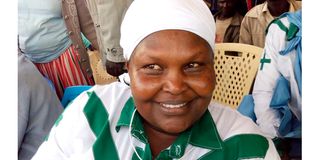Pastoral women seek alternative plan to the enactment of two-thirds rule

Director of Pastoral Communities Empowerment Programme Rodah Rotino. She has called on the government to implement the two-thirds gender rule.
What you need to know:
- Women from pastoral areas have called for an alternative strategy to ensure realization of the two-thirds gender principle in political representation.
- Many women in pastoralist communities live under difficult socio-economic conditions.
Women from pastoral areas in the North Rift region have called for an alternative strategy in ensuring the realization of the not more than two-thirds gender principle in political representation.
They said failure by Parliament to pass the proposed law signalled the need to re-examine strategies to ensure the implementation of the Constitution in relation to the principles of equality and inclusion.
Many women in pastoralist communities are disadvantaged and live under difficult socio-economic conditions, and are marginalized in arid and semi-arid areas.
A 2021 data by the Pastoral Communities Empowerment Programme (Pacep), an organization that supports women, girl child and youth shows that 92 per cent of women in West Pokot are illiterate.
Pacep director Rodah Rotino now calls on the national and county governments, and non-governmental organizations to equip women with business and production skills, promote their access to rural financial providers, and help them access markets for them to be economically empowered.
Pastoral areas
Ms Rotino said that as women leaders, they support the two-thirds gender rule and asked the government to implement it so as to improve the lives of women from marginalised pastoral areas.
She called on the government to implement the two-thirds gender rule, noting that it will help women get a fair representation in leadership at the county and national levels.
Speaking in a women's meeting in Kapenguria last week, Ms Rotino noted that they have been side-lined in development issues.
“No woman from Pokot was appointed as nominated senator or MP or even as chairperson of a board. The president should do something,” said Ms Rotino.
She reiterated the need to educate women and offer them employment opportunities.
“Women need civic education for them to rise to greater heights,” she said, calling on the national and county governments to set aside women empowerment funds.
Forced marriages
A community facilitator Emily Partany, said many girls in the area have dropped out of school following retrogressive practices like female genital mutilation and early forced marriages.
“This has contributed to young girls undergoing difficulties in life. Those involved should be arrested and face the law,” she said.
Ms Partany said cases of gender-based violence against rural women are on the rise in the region and emphasised the need for their empowerment them.





